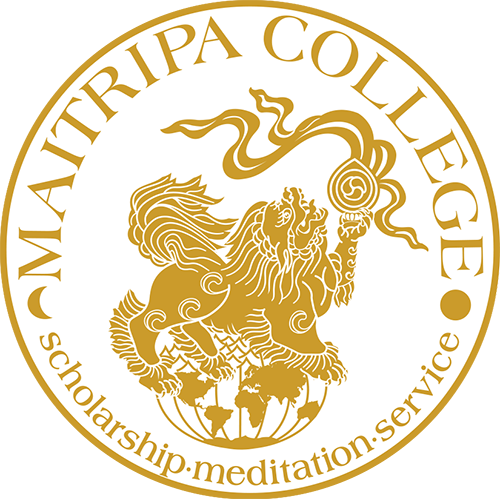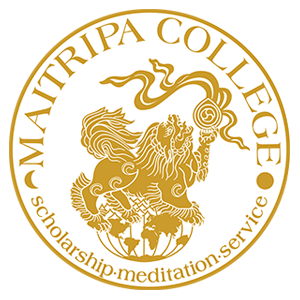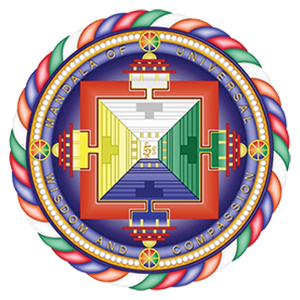Rationale
The Service Pillar at Maitripa College is a holistic curriculum for this “pillar” of education at Maitripa College. Following Dee Fink’s Taxonomy of Significant Learning, each class in the service pillar has been carefully constructed based on the expression of learning outcomes in terms of Fink’s six-part taxonomy. These are as follows:
- Foundational Knowledge: Understanding and remembering information and ideas
- Application: Skills; critical, creative, and practical thinking; managing projects
- Integration: Connecting ideas, people, realms of life
- Human Dimension: Learning about oneself, others
- Caring: Developing new feelings, interests, values
- Learning How to Learn: Becoming a better student; inquiring about a subject; self-directing learners
In addition, our service pillar is informed by the following sources:
- Ongoing dialogues with pioneers in Buddhist ministry regarding field education, contemplative curricula, spiritual formation, and theological education nationwide
- Learning objectives, content, feedback, and evaluations from past courses in Service at Maitripa College 2012-current
- Board of Chaplaincy Certification Inc. (BCCI) graduate education equivalencies
- FPMT Teacher Requirements
General Overview
The service curriculum spans an introduction concepts of import in the developing field of “Buddhist Ministry” (a term with many definitions at present, but broadly considered to be the field of introducing people to paths of service informed by their Buddhist practice) and an exposure to some of the conversations and practices alive in the field, as well as addressing some specific recommendations by organizations that validate Buddhist chaplains and/or ministers. This curriculum design relies on “spiraling” pedagogy, in which the student is brought back to addressing the same questions along the entire spectrum of learning, again and again. This type of learning is particularly effective in contemplative education, as the nature of the learning is a deeper and deeper analysis of repeated concepts, which ultimately leads to transformation of the mind.
Year One: Fall
CS301: Foundations of Buddhist Service: Who We Are and Who We Serve
This course is an introduction to the service core at Maitripa College for all students, focusing on understanding and developing a Personal Theology both within and outside of the Buddhist tradition, understanding the concept of spiritual transformation through service, and developing an understanding of “suffering” in the context of a Buddhist worldview This course includes a 15-hour concurrent servicelearning project.his course includes a concurrent 15-hour service project.
Year One: Spring
CS302: Finding Your Voice: Communication and Context
This is the second course in the service pillar at Maitripa College, which builds on the foundation of the first term, exploring concepts and practicalities related to identifying and expressing yourself as a spiritual leader in modern society and establishing a unique and relevant “voice.” We will explore traditional, historical, and contemporary “voices” of Spiritual Leadership, and mediums for expressing that voice, including online platforms, the Academy, spiritual communities, and others. This course includes a concurrent 15-hour service project.
Year Two: Fall
CS303: Chaplaincy and Models of Spiritual Care
Spiritual Care, or offering the arts of ministry and chaplaincy in the midst of others’ suffering, is now being done by Buddhists in a variety of secular and multi-faith contexts. Through multiple roles, institutional settings, and activities, they are integrating Buddhist religious education, personal spiritual formation, and ministerial agility into their vocation outside of Buddhist communities. This work is informed by, at times in tension with, and also beginning to influence Chaplaincy models of care. This course aims first to understand the history of chaplaincy, what chaplains actually do, chaplaincy specializations, and the paths (educational, personal, religious, and clinical) to professional chaplaincy. The course will then explore innovations and current research in the field of chaplaincy, and prepare students to apply for Clinical Pastoral Education (CPE) residencies. The emergence nationally of various forms of Buddhist ministry and chaplaincy will be situated in relation to this context. Ethical codes, standards of practice, and chaplaincy competencies will be explored towards the formulation and articulation of one’s own Buddhist theology of spiritual care. Students will broaden their base of compassion and strengthen internal resources through theological reflection on how they may wish to embody arts of Buddhist spiritual care. This is the third course in the service pillar at Maitripa College and includes a concurrent service project.
Year Two: Spring
CS304: (2 credits): Servant Leadership in Buddhist/Spiritual Communities
This course will explore methods of servant leadership in support of Buddhist/spiritual communities, with a particular emphasis on cultivating the inner and outer qualities of skillful community ministry. Students will develop their understanding of our impact on others and increase awareness of how issues such as equity, trauma, ethics and so forth inform the ways in which we share and represent the dharma. This course will help strengthen students’ understanding and practice of compassion for others, including discussion of contemporary application of skillful means, co-constructing spiritual practice environments, facilitating group practices, religious education and pedagogy, working in relational dynamics, and integrating these pieces into one’s personal service. This is the fourth course in the service pillar at Maitripa College and includes a concurrent service project.
Year Three
Year Three Service Hours are composed of an individually constructed experience, internship, or course of study, overseen by a Maitripa College faculty member.


